#and I was thinking more along the lines of Chinese engagement traditions ish
Text
The Half of It (2020)
Okay so first of all….. this is the best movie ever in the whole world….
I mean it..!!!!!
I cried watching the trailer for it, because immediately it felt like exactly what I needed after Never Have I Ever (review <here> – unfortunately I will be referring a fair bit to the series in this review).
The Half of It (Half) felt something like an antithesis to NHIE, if you will. This is a teen love story that is pure in both meanings of the word: purity in its wholesome, innocent, raw, simplicity of emotion and feeling and love, and purity in terms of unadulterated content perfectly suitable for its context, everything so appropriate and coherent and in-place i.e. no dumb jokes where they are not needed (in fact no dumb jokes at all), no pandering to any audience, no desperation to appear logged-on by referencing any internet culture… Unlike NHIE which rams internet culture down our throats, Half is so much more relatable because of the lack of it. A timeless classic, some might even say.
Really… this was so so so … I want to think of another word for pure because that itself is such an internetty word lol. Hmm.. this was just so genuine I guess? It reminded me of what early 2000s indie teen romances were striving toward but could only ever grasp at in futility because they tripped over their untied laces in the process. The untied laces representing the pretensions the narratives often got caught up in, aiming for cool and subversive or off-beat but ultimately remaining unrelatable, unrealistic and lacking soul in all its quirkiness. Something that comes to mind for example is Submarine (2010) by Richard Ayoade? I dunno, I never watched it cos it was too annoyingly annoying for me so I don’t even know why I’m bringing it up at all lol, but I know that even as a teen I could tell that it’s self-awareness just translated as self-consciousness and what is intended as delicate and niche just ends up being too loud in its non-mainstreamness… do you know what I mean? That kind of movie where the indieness is too indie and its just fucking annoying? Again, I’ve never seen Submarine so I’m not quite sure I’m even hating on the right thing (in fact I just tried to watch the trailer for it and its so gross omg) but basically what I’m getting at is that The Half of It is absolutely not that kind of coming-of-age film. Because it rocks… af.
Right, so here are the synopses for this lovely film, directed by Alice Wu:
- When smart but cash-strapped teen Ellie Chu agrees to write a love letter for a jock, she doesn't expect to become his friend - or fall for his crush.
- A shy, introverted student helps the school jock woo a girl whom, secretly, they both want.
Gonna do some character introductions because I shall be referring to them specifically a little. Actually, you know what, maybe just watch the trailer? Because it’s just… fucking good… but also because then my review will make more sense I hope!
youtube
Do you feel the overwhelming pureness, the simplicity? I dunno, I don’t have much to compare this to, but are all ‘good’ coming-of-age / teen romance films these days of this mood, are they this solemn (yet fun…), do they all do their characters this must justice by giving us wholes of their lives, their environments, their homes, their after-school selves? I doubt it…
(later on once I’ve established more that is great about this film, I’ll compare it to some other works that the tone of this one reminds me of)
OKAY SO
Ellie Chu, the Chinese-American protagonist, writes hundreds of essays for basically everyone in school, for a fee, to support her single father who’s the manager of the train station. Then Paul, the guy, enlists Ellie’s help in writing a love letter to the girl he’s in “love” with, Aster the great beauty (who’s also other things obviously). So Ellie, pretending to be Paul, writes letters to and converses via some secret messaging app with Aster, who Ellie herself also has deep feelings for, feelings which only grow with these interactions. Paul, not knowing about Ellie’s feelings, is caught unawares when he realizes Ellie’s truth. So these are the three main characters whose lives and thoughts we follow, and my first comment is that they are incredibly compelling characters! It’s really rare for me to like one character in a film to this extent, but here I found myself enjoying all three of their journeys, found myself relating to thoughts, wanting to be brought along with them all the way, individually and together.
So if one had to simplify the plot, it could perhaps be described as a love triangle. And about this triangle, what I like the most and what I found to move the story along so well was how clear everything was to us from the start. From the moment Aster’s name is uttered* to Ellie (when Paul asks Ellie for a letter to Aster), it is clear that Ellie is in love with her. There’s no sudden realization later on in the movie, there’s no unfurling of sexuality or conflicted thoughts – Ellie knows her feelings (or rather, has known), knows herself, and so do we. And it was... really refreshing and nice? To immediately be thrown into the triangle knowing all the stakes involved, all the feelings apparent. And I liked this too at first because I thought it would be you know, like those utopian-type film-world where sexuality isn’t an issue, where Ellie’s love for Aster would be a problem insomuch as she was in love with her friend’s love interest and not because she was in love with a girl. Because Ellie’s hush over her own her feelings, her furtive looks (like in the toilet scene -gif below- omg fucking epic scene I’m cryinggg) toward Aster, and other hidden manifestations of her love for Aster are all in line with her introverted personality, coherent with how she’s lived her whole live in privacy and isolation. So the hidden sexuality part wasn’t explicit, I mean, because it could have been read as her just being a shy girl – and this is nice, it’s interesting, because again it normalizes the same-sex attraction by not mentioning it at all as the issue.
(Edit*: upon rewatching, I realise I was mistaken and we see and vicariously experience Ellie’s feelings for Aster even before her name is uttered! And it’s a beautiful scene... LOVE THIS CORNYASS FILM!!)
But later on Paul says something that reveals this utopia isn’t the world the movie is set in. He jerks us back to reality like this, toward the end-ish of the film, i.e. when he and Ellie have already become besties:


Of course I may not have the greatest legitimacy to speak on it, having very fortunately never had to be on the receiving end of something like this, but I don’t think I would necessarily couch this as ‘homophobia’, even if that’s the overarching effect…? Do you know what I mean? There’s so much more here, more in Paul’s immediate response that is both hurt and hurtful, than just homophobia. It’s about the that that he has never been out of this tiny train-stop town, the fact that his over-crowded house is incomplete and utter chaos each time he steps back into it, how he doesn’t have a second to himself each day to think on his own or to simply be, where tradition is heeded because it is the only thing that ties one to heritage, to any memory/experience of anything meaningful beyond the daily, dull grind in an utterly dour town. Paul doesn’t have the luxury of expanding his mind beyond this world, doesn’t have romantic hours in the blue fog like Ellie where she reads non-stop in her tiny booth by the railway tracks waiting to ring the crossing bell twice a day, where her father holds a PhD (even if they aren’t close or don’t engage in mind-expanding conversations, I mean that this definitely adds to the culture she’s been brought up in, which must be so so unlike Paul’s).
I find there are two key scenes which help us to understand this ‘homophobia’ of his (again, this is not at all an accurate or meaningful way to view his instinctive rejection of Ellie’s sexuality and feelings for Aster, but I’m just using the term to contextualize it as just one symptom of his greater upbringing).
The first scene is where Paul, whose family has for generations run a meat business, discusses with Ellie his desire to branch out into new, non-traditional sausage recipes. It doesn’t hit as hard out of context, so plzzz watch the film to get the full effect and get ready to crey real tears but this is what Paul says in a beautiful scene, and you won’t get the No Exit (Sartre) mention unless you watch the whole film so just ignore that first and I think the rest of Paul’s touching monologue speaks well enough for itself:
The thing about No Exit is it's like how what I really want is to run my own shop, with new recipes. And-- And FYI, taco sausage is really effing good.
Okay, but I'm the fourth son and my family's been making the same sausage for 49 years and it doesn't matter if they're going broke, or out of style, they're Nana's recipes.
If Ma can't have Nana, at least she can make her sausages. If I break away, it'll break her heart. And it's either her heart or mine.
So I stay.
The other scene that helps ‘couch’ the homophobia and helps frame that painful scene is this one below, where Aster speaks to Paul. After she’s had a random day with Ellie, driving to her “favourite secret place”, floating together for hours in a hot spring while they 谈天说地 (casually talk about everything under the sky and everything on earth), during which it is clear that they have some kind of bond that neither has ever experience and a deep connection that they both need very much, she returns back home and meets Paul and they have this conversation (I got the dialogue straight from a PDF of the full screenplay):
- [Aster] Hey.
[indistinct sports radio chatter]
- [Paul] Hey. [soft chuckle]
- [Aster] Do you believe in God?
- [Paul] Uh... of course.
- [Aster] Yeah.
- [Aster] Yeah, no, of course.
So this scene takes place beside a trash bin late at night where Paul is emptying, erm, trash. Lol so when Paul answers yes of course, that’s his answer because… of course it is. How could it be anything else? And so his rejection of Ellie, his leaving her in the dark upon finding out her deepest secret (of her feelings for Aster) hurts but it’s not cruel. It doesn’t turn our hearts cold against him, because we feel sorry for him. We do because we have to. I’m not saying we should award all homophobes of the world this generosity, but it sure helps us empathize with a lot that is beyond us. Things to do with generational upbringing and religious traditions and smalltown cultures and whatever else that I can’t even pretend is remotely relevant to my own life. But I just thought that his reaction to Ellie, cutting as it was in the moment, was the logical expectation given what we knew about him. And basically what I mean is that this is the best film ever because everything is real, and everything makes sense, and Alice Wu is the best person on earth, I do believe.
And I’m sorry to have to go back to NHIE lol (I mean I’m really sorry – so sorry that I’m even speaking of them in the same sentence when they are so different omg it’s insulting) but really, there’s no reason that Half had to be THIS much better than NHIE. They have almost identical central themes: teenage female protagonists with Asian-immigrant roots in an American town, both feeling the pangs of loss from having a deceased parent (Devi’s father from NHIE and Ellie’s mother from Half), both featuring many scene in a high school, both dealing with first crushes. And, okay, both have the exact same epically high Rotten Tomatoes scores (96%), but… that’s just an accurate representation of the goodness of one and a ridiculous lie for the other. Take my word for it :)
Okay I suppose this is a good time to mention the other films that Half recalled in my mind!
1) There’s a scene, (screencap below) where Paul speaks to Ellie’s dad, only because the latter is not confident in English, he speaks Mandarin to Paul who stands and seemingly understands every word, because the message is clear as day. This is a lot like Lilting (2014), and not just because of the sexuality and Chinese-parent aspect where in Lilting, Ben Whishaw’s character speaks to his dead lover’s mother and they converse, her in Mandarin and him in English, exactly like the shared conversation here in Half. But this scene also has, as in Lilting, the extremely painful longing for closeness of any, all kinds, the desire to be seen and understood and accepted, the desperation for a bridge between two who may be worlds apart. And Lilting is truly an incredible film, so my commenting on this resemblance is meant to be entirely complimentary!!
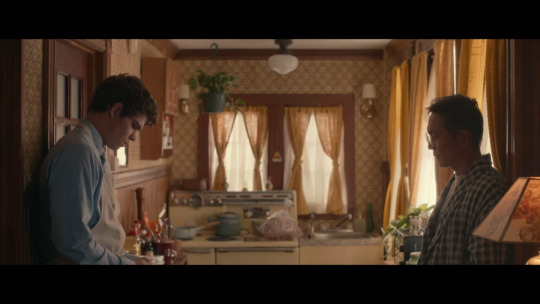
^ Half above, and Lilting below
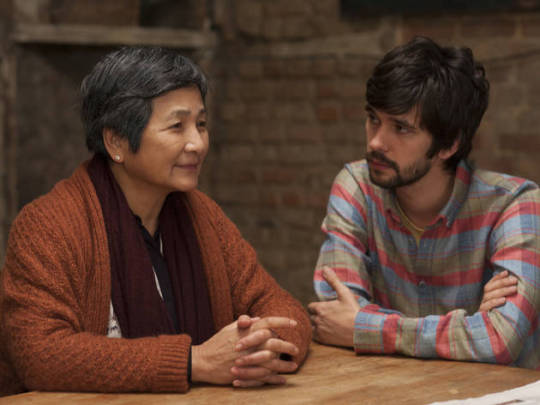
2) In general the erm pureness (yes I swear I’ll start reading again soon which shall hopefully re-expand my vocab so I don’t have to keep using this same lame word over and over) of the mood of the film also calls up I Don’t Want to Go Back Alone, or Eu Não Quero Voltar Sozinho. This was a huge Youtube short film from years and years ago (2010) that I remember watching about a hundred times over, it’s Brazillian and under 20 minutes but it was so successful and compelling that a full-length feature film was later made in 2014 based on the characters and simple story that the short was based on. I don’t know if Half will grow to be that iconic, to bestow the world with oceans of fanfic etc, because now that there is so much choice and variety of entertainment Half may just be one of the many, but it feels like it shall leave a similar legacy. There are similarities in theme and plot, where The Way He Looks has a male-female best friend duo where they find they both have feelings for the cute new boy in school, oh and also the male bestie is blind so I suppose there is some similar comment on marginalization there, like Ellie’s immigrant status for which she is taunted for and which holds her father back from jobs much more suited to his capabilities. Anywayyyy yea just thought that Half reminded me of the same innocence and same budding feelings and forays into the world of a friendship being complicated by issues like sexuality and I loved being reminded of it!
3) Also, very unfortunately, I was reminded of this shitty crap I saw a short while ago on Netflix just to pass the time while exercising, All The Bright Places. I thought there would be, at least, something sweet in its “sadness” (quotation marks cos the tragedy of the plot is handled so fuuuuuuckkkkking badly) and maybe something moving even in its predictable contrivance but bro it was literally the worst shit in the world and I stopped about halfway through the film, actually right in the middle of this scene that I’m about to bring up. Fuck even just re-watching this clip has killed me. Fucking disgusting movie!!!
Okay so I tried literally for an hour to upload videos (having taken vids of my laptop screen with my mobile, then combining clips into one mashup video because the app only allows for one video per text post, and then trying 5 times to post it without any success for some reason, and also being unable to attach it via the web version) but I have to resort instead to these screencaps, which, disgusting as they already are, still don’t do justice to the crappiness of the whole scene which literally went on for minutes. So anyway here’s the Bright scene that offends every bone in my body:

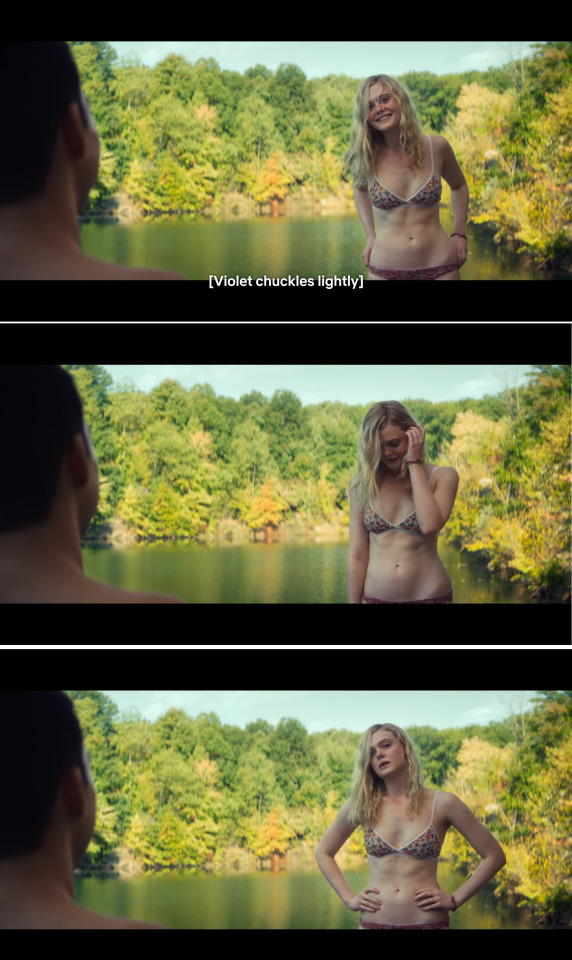
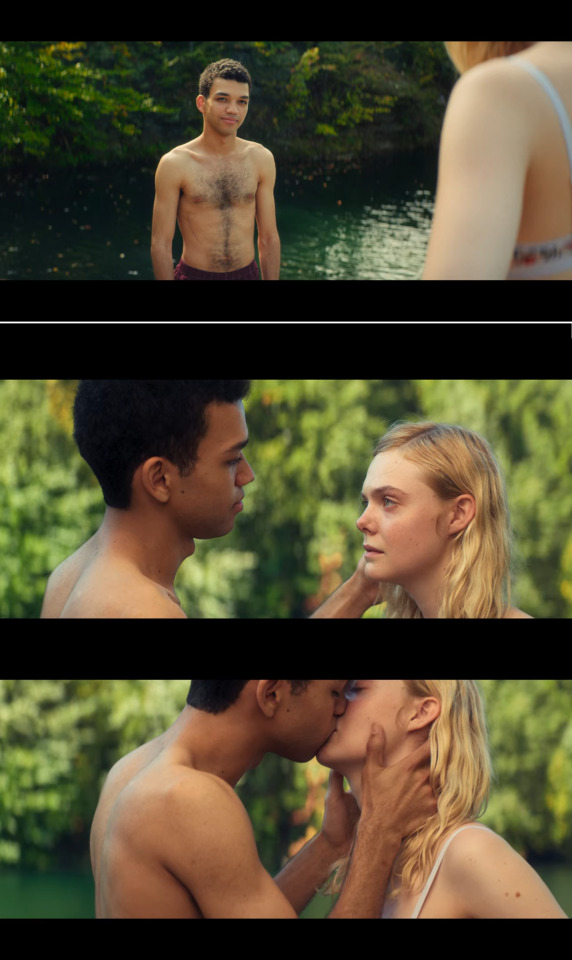
And here is the genuinely tender and sweet and moving and touching and appropriate and epic Half version, where the stripping takes up about 2 seconds of screentime, with no chest or shoulders or stomach on display because they, you know, actually get to the point of the scene, to the conversation and moments that actually move the plot forward and serve as more than just fodder for pedo men watching:
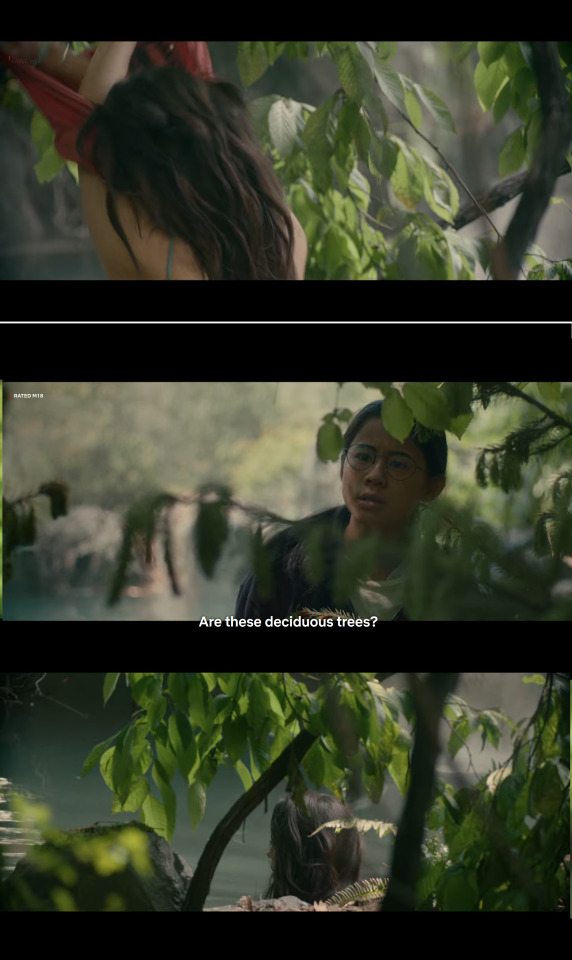


Could these two scenes be any more different, seriously? And why should they be this way? Oh, right, umm, maybe it’s because Half is written, directed, and produced by a woman (Alice Wu, who I shall write a little about later), and All the Bright Places is directed by a man? Sure, the author of the YA novel by the same name that the film adapts is one of the two female screenwriters who wrote this film but in a scene like this, direction clearly comes from the director right? Sorry if my fleeting brush with film studies years ago has proven to teach me nothing accurate but yea I do think, seeing a scene like this, that the screenplay (by the two women) may say, you know, Boy and Girl strip and jump into the water, but the scene above that we end up seeing is more the result of the director saying something like alright lads let’s really keep the camera on her for like a good minute, let’s just really take our time on this attractive young girl and lets make sure everyone sees how HOT she is but also how CUTE and SWEET ok?
It’s just so so so sexualized like it is just me? Do you guys see it too? Seriously it’s so indulgent and exploitative and inappropriate and unnecessary and it SUCKS bleauughhh! Compare it to the exact same idea in Half. They’re both showing basically the exact same activity right, both where one teen brings another teen to their favourite spot and makes moves to jump in, while the other teen in both films is seemingly hesitant / shy at first about doing so before eventually joining in, except that for Half, we see about 5 milliseconds of the actual undressing. Because it should be obvious right? The focus of the scene is about the subsequent floating, about the intimacy of bringing someone new to some place special to you, about vulnerability and friendship and love and blah blah whatever and the stripping of clothes is but an obvious means to get into the water, so there’s no ambiguity even if the scene cuts from two fully-clothed characters on land to two half-clothed characters in the water I think fucking everyone would understand what had occurred right?! Meanwhile we are forced to fixate on Elle Fanning removing each and every single item of clothing from her waifish body, forced to examine the torso of this girl who is meant to be mid-teens?, forced to understand her as beautiful and desirable and demure and enticing because we see her through the eyes of the guy whose glances are as unsubtle as they come and IT’S FUCKING GROSS LA fuck. FYI like I said I never finished watching this dumb film cos I literally couldn’t finish this stupid swimming scene so idk maybe it gets better and it’s ending rocks af but yea probably not ..
4) Of course, Notting Hill (1999)! In Notting Hill, the beautiful cute iconic scene where Julia Roberts asks Hugh Grant for .. well basically asks if he’d be willing to take a chance with her, to work together for a relationship and he says umm nah and she says: Don't forget -- I'm also just a girl. Standing in front of a boy. Asking him to love her.
Similarly, in Half, Paul goes on his second date with Aster (after being wingman-ed af by Ellie) and Paul and Aster’s conversation falters (not that there was much momentum to begin with) and Ellie (who is sitting in Paul’s truck watching them on their date through the diner’s window lol) texts Aster with her phone (pretending to be Paul), and says “I get nervous when you’re close” and after a bit of ‘banter’, Aster replies “I’m just a girl”
Loved Notting Hill and always loved that funny just a girl line for it’s strange, spontaneous, unsophisticated simplicity, so again, as with Lilting and I Don’t Want to Go Back Alone, I enjoyed this reference a lot! :-)
Okay one last main point before I end off this longass ramble with some general points and then I’m done for real
So in Half, Ellie’s character is “deep” and “philosophical” and “smart” while such traits especially in teens would usually annoy me because of how badly they’re written, Ellie never displays these sides of herself intending to exclude others, or alienate or humiliate anyone for not being like her. While it is clear that she is different in so many ways from 99% of her peers and from her entire town, it never results in any kind of chip on her shoulder, and she proves to always see herself very much as a part of her environment, and so despite being the biggest fish in a tiny bond, Ellie remains relatable, likeable throughout when it would have been so easy to make her you know, too big for her boots.
This characteristic of Ellie’s, her ‘deep’ talk and how in her writing and texts to Aster, in wanting perhaps to convey her uniqueness or her smartness, the conversations read a little not-normal, in the sense that most of us won’t be able to relate to having dialogues like that, not because of the content but just the style being a little too not naturalistic, so some may feel that takes away from being able to believe in the characters as real people, anyway sorry for this longass sentence BUT this much-elaborated-by-me characteristic of Ellie’s reminded me of a description of Hermione from the Prisoner of Azkaban (2004)! In the film, Professor Trelawney says to an uncharacteristically recalcitrant Hermione:
You may be young in years but the heart that beats beneath your bosom is as shriveled as an old maid's, your soul as dry as the pages of the books to which you so desperately cleave.
And, again, I think Ellie’s ‘pretentious’ dialogue (quotation marks cos I personally found it very coherent to her context and personality and was not offended by those trying-to-appear-smart bits haha) is what it is simply because she hasn’t had much beyond books and words to keep her company all her life. Her father’s love language certainly doesn’t seem to be conversating, and she has probably never had a good friend (or a friend at all?), and so, yes, there have probably been hundreds of dry pages to which Ellie has desperately cleaved through her years in Squahamish. And I think the point of the events in this film was to show that without having met Paul, without having confronted her feelings for Aster and getting to know her personally, without playing her sweet guitar song for her whole school, she would, as Trelawney accuses Hermoine, have gone on to possess a heart as shriveled as an old maid’s. The incidents in the film steered her away from said shreivelness and dryness, and toward a fresh, authentic, golden self.
OKAY I want to limit myself here because without one (a limit), I would literally analyse every scene and dialogue ad nauseam and ya no one would care for that so I just want to mention finally that the reason why this film is the best ever, why it’s so tenderhearted and utterly transporting, why its characters are so likable, why it was able to strike a perfect balance between all things light and heavy, why you can’t help but want to hug everyone you see on screen is because I guess Alice Wu is just an iconic genius! She shows different kinds of love (familial, romantic, platonic etc) and all the types of closeness and longing and dreaming in the film and its heartening to know there is a voice like hers in this mainstream YA world because, especially with things like NHIE and All the Bright Places out there, Alice Wu is clearly much needed.
Here is a bit of her director’s note for the film – it can be viewed in full <<<here>>>. I’m copying these two sections because they frame the film nicely, and again, just as NHIE was a semi-autobiographical tale from Mindy Kaling, Half is the same for Alice Wu, just that Half you know, actually tells a story.

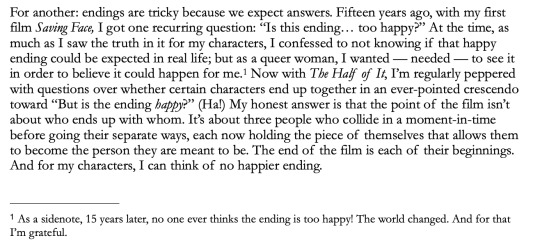
And I like how, like she says, the film ends with our 3 lovely characters beginning their lives.
Okay so… bye! Hehe :)
0 notes